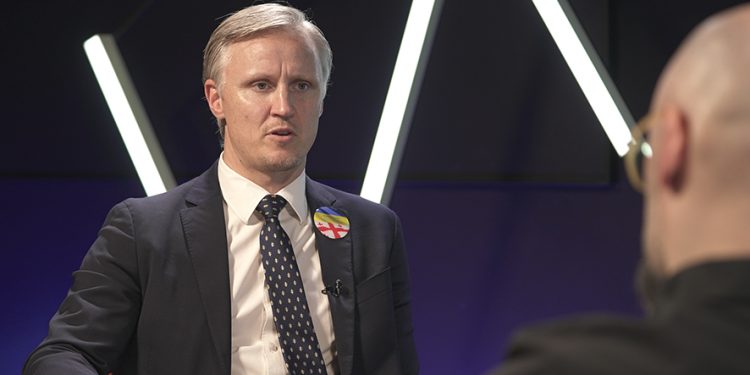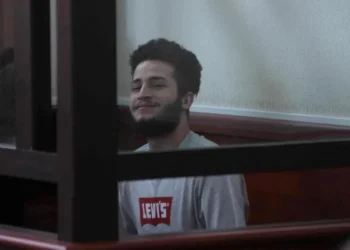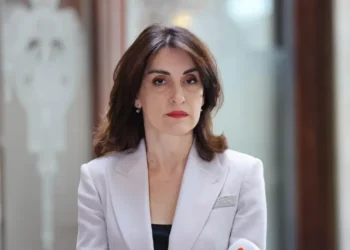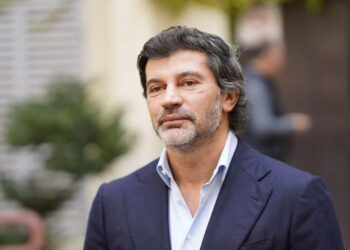Rihards Kols is a Latvian politician of the National Alliance who was elected member of the European Parliament (European Conservatives and Reformists Group) in 2024. Radio Free Europe/RL’s Georgian Service sat down with him at the Tbilisi International Conference to get his view of the current affairs.
The panel downstairs was called ‘How to Hold Putin Responsible, Accountable.’ How likely is it that Putin will be held accountable and what does it depend on?
Realistically, of course, it might take years. It’s not like the Nuremberg Tribunal, when a country instantly capitulated and the leadership was arrested and tried. Since ICC’s inception in 2002, they have issued 38 arrest warrants, and 17 are still at large, so less than half have been arrested. I think the most important principle of this is impunity.
That cannot prevail. This is the lesson we learned from the sacrifices the world had to make during WW2. This is a moral duty. No matter how long it takes, they will always be accountable for their war crimes, crimes against humanity. There are still trials ongoing for the Nazi collaborators aged 100+ that are still alive. They’re being told there’s no excuses for what they’ve done, and they are tried.
This principle that impunity cannot prevail is especially important in Russia’s case, because we know from the violent history of the country, be it Tsarist Russia, the Soviet Union, or the modern day Russian Federation – it is a country that relishes in impunity, waging wars, and being aggressive. Why? Because there’s no accountability. That emboldens their citizens, too, and then things like Bucha and Irpen happen. Those soldiers are criminals; they have no honor. They see that they can commit crimes and not be held accountable because their leader, their country, will protect them.
How much of your resoluteness can be put down to the fact you are from Latvia, a country which would probably be in danger itself if Russia were to prevail in Ukraine?
There is a narrative that if Ukraine fails, the Baltics are next. Don’t buy into it. We’re in NATO. How can you separate something that is a unified entity, where everyone at all the summits so far has said “not an inch.” You won’t stop the aggression with appeasement, but there are politicians in the West that think that if you appease the tyrant, then maybe you can have partial peace. Yet, again and again, Putin has shown he’s ruthless; he has indicated that he’s going to play the patient game, to outlast the West and, actually, compared to the West, he is putting the money where his mouth is. His economy is a war economy. His military industry is working 24-7, delivering 3 to 4 million shells a year, while, where Europe’s combined military capabilities massively outweigh Russia’s, it is struggling to deliver 1 million shells.
We have to be critical of ourselves. There are a lot of flaws in our policies. There is hesitation. And I always say to my Western colleagues that nothing provokes Putin more than showing weakness. Hesitation is seen as a weakness by the Kremlin. The only policy that Russia understands is strength. Reagan is becoming very popular for his stance during the 80s and 90s. Peace is only possible through strength. And this is exactly how we have to do business with Russia.
Strategically defeating Russia means crippling its economy and military capabilities so that it cannot endanger neighboring countries in the future. It might be even a buffer zone at the expense of Russia’s territory. The problem is there is as yet no consensus in the West what that “strategic defeat” will be.
What’s at stake for Georgia now?
Georgia is diverting from the path that it enshrined in its constitution as its people’s ambition for Euro-Atlantic integration, including membership in NATO and the EU. This path has become increasingly rocky over the past months. Georgia had candidate status granted it, through mere luck, I would say. Right now, of course, there won’t be any moves from the EU – up until the elections and even after the elections. The ruling party ‘s initiatives I cannot describe as anything than pushing Georgia back into Russia’s orbit.
How has the EU handled this affair so far? And what should one expect in the future from Brussels?
Every member state has the right to submit a proposal, so I cannot predict what might be put on the table, but I think the EU rhetoric right now is that nothing is off the table when it comes to Georgia. I’m hearing politicians in Europe saying there should be individual sanctions applied on those who voted on or drafted the “Russian foreign agent law.” Freezing the visa-free regime is, in my personal opinion, a path we should not go down, because, what’s the logic of it? Who gets punished? The Georgian people. And that is something that will damage the EU’s credibility. The bottom line for this topic is it will be a decision made by each member state. There has to be a consensus, but it’s certainly not just waggling fingers.
We realize the potential cost from the Georgian point of view. How is it seen from Europe’s point of view? Do they realize they might be letting Georgia go into the Russian orbit?
That phrasing implies that it is us who determine it, as if, with our decisions, we’re going to turn Georgia into Russia. What I’m seeing here is, and I would call it a curse for Georgia, is that “the principle winner takes all” is something that defines politics in Georgia. And that’s an issue. If you want to be a mature democracy, that principle should be abandoned. Just last year, I met the opposition parties. They were contradicting each other on different policies, on different topics I will not name. I was left the wondering whether, no matter who wins in the upcoming elections, say the ruling party loses and the next one gains the same amount of support as the ruling party, they might not just do the same to their opposition? The track record shows it. And maybe that’s the mentality. I don’t know. But this is something that needs to be discussed within the political circles. “Are we ready to step past these differences and actually get to work? Even if we don’t agree on everything?” In Latvia, we have a multi-party system. In the last parliament, we had a coalition of five parties. It’s not easy, but that’s the cost of it, and that’s Georgia’s citizens’ decision to make.
Interview by Vazha Tavberidze














